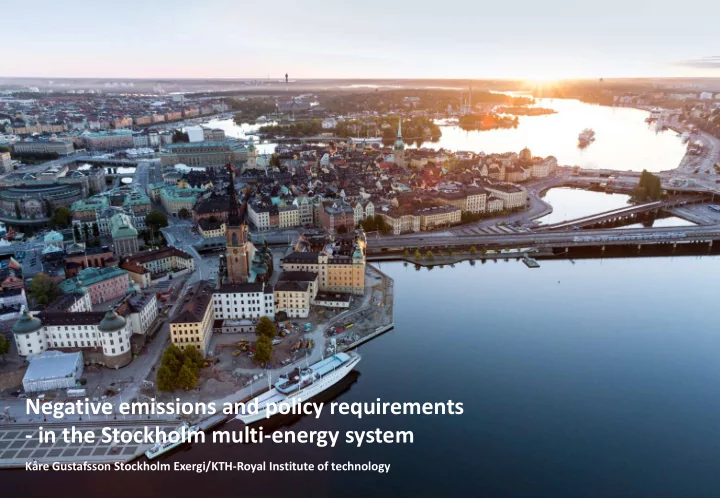

Negative emissions and policy requirements - in the Stockholm multi-energy system 1 23.9.2019 Kåre Gustafsson Stockholm Exergi/KTH-Royal Institute of technology
Emissions of CO 2 -eq from district heating and electric power production in Stockholm: 75 % reduction until 2024, negative thereafter Fossil oil removed Plastic sorting, biochar Fossil coal removed, biochar medium Biochar large 5 TWh 10 TWh BECCS (BE)CCS on waste-to-energy plants 2
Production of biochar and district heating - Minus 100 g CO 2 /kWh heat - Minus 1 ton CO 2 /year for normal appartment - Negative emission district heating sold on market in Biochar plant in Stockholm Stockholm 3
Test facility for BECCS - 400 MW biomass fired CHP plant - Aim: suspend disbelief in technology - Full scale can remove 800.000 ton of CO 2 /year Test facility BECCS
General view on CDR policies - Several CDR methods should be incentivized, since none is presently foreseen to alone facilitate necessary carbon sinks to meet the 1,5 °C target. - Policies should be specific for each CDR-method (or group) during initial establishing of technologies in order to reach market readiness, since they differs with regard to - permanency - scale - potential - technological maturity - investment costs and operational costs - If possible policies should also add other benefits apart from CDR, such as: - fossil emission reduction - adaptation to climate change - waste reduction
Required policy support for BECCS • Focus on supporting operational costs, also covering the investment. Investment funding alone will not ensure that plants are operated. • Support needed is in the range of 100 €/ton of removed carbon dioxide. • Several options for financing BECCS from biomass incineration: - Tax or market credits for each ton of removed carbon dioxide, financed by fossil carbon tax or market based credits. Will also work towards fossil emission reductions. - Public reversed auctions, i.e. governments buying negative emissions. Will ensure cost efficient BECCS deployment. Marginal cost abatement curve will be followed. - EU-ETS is not a short term option, but could be a long term alternative if carbon price and BECCS cost converges.
Required policy support for Waste-to-Energy (BE)CCS • Two thirds of the energy in waste is of biogenic origin, therefore net negative emissions will be the result of carbon capture on Waste-to-Energy plants. • Two options for financing: - Packaging fee on fossil based packaging materials. Is likely to lower amount of fossil waste. - Regulation that dictates that Waste to Energy fossil emission should be countered by CDR. Either directly with CCS on the Waste-to-Energy plant, or by trade with market based carbon credits. Cost burden will transferred to the public and organizations that generates waste. Could drive towards less waste generation.
Required policy support for Biochar • Focus on investment costs for smaller units, up to 10.000 tons of biochar per year. - A support level of around 40 % of the investment is likely to ensure profitability for projects. - Biochar is assumed to be sold for usage in commercial soil or as a feed additive, with corresponding high biochar price level. - Farm scale biochar units will be deployed by this incentive, since there are added benefits for farmers. Shown by current incentive scheme in Sweden. • For large scale biochar units is support of operational costs might be a better option. - Biochar would be aimed at the agricultural market with lower price level. - Either supply or demand side can be incentivized, but should be harmonized between regions to avoid unfair competition. - To reach agricultural mass market, incentives of around 100 €/ton of removed carbon dioxide is foreseen as needed, based on our market analysis of agricultural benefits and paying capacity of farmers in Sweden. - Will have additional benefit of adaptation to climate change. - Financing could be by reversed auction, carbon tax credits, i.e same as for BECCS. • Compulsory Biochar carbon sink certification necessary to avoid flooding of market by low grade biochar with a fast degradation rate.
Thank You! Kåre Gustafsson Stockholm Exergi/KTH-Royal Institute of technology 9 23.9.2019
Recommend
More recommend